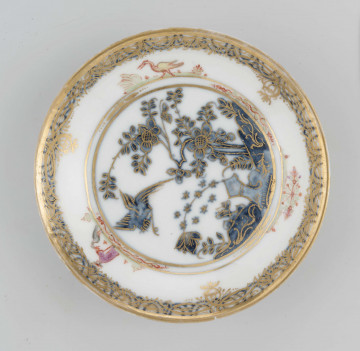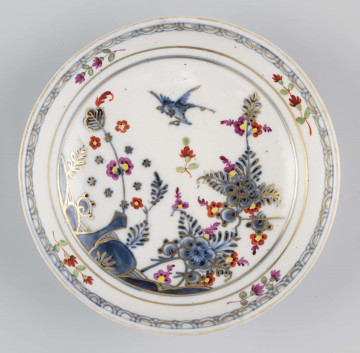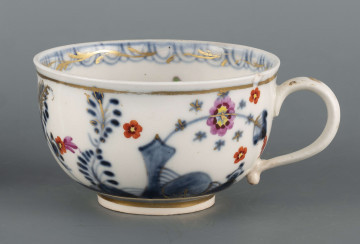
Saucer
1730 — 1740
National Museum in Lublin
Part of the collection: European porcelain
The teapot and saucer are typical examples of the work of the so-called Hausmaler, who played an essential role in the history of European porcelain manufactories, including the Meissen manufactory. The bowl without the handle and the blue under-glaze decoration are based on Far Eastern porcelain, which is characteristic of the early period of the Meissen manufactory. Other patterns were applied outside the factory.
In the 18th century it was widely practised to paint porcelain in small, sometimes homemade workshops. Cottage decorators bought white or modestly decorated porcelain, often with minor defects, from the factory and paid moderate prices for it. They would paint additional coloured and gilded ornaments on the surface, burnish them for preservation and sell such enriched vessels at a profit. Their painting was sometimes of a very high level, sought after and highly valued. Therefore, they competed with manufacturers who, defending their interests, often made it difficult for them to buy vessels in bulk. Many works of this type were made to the special order of connoisseurs, who wanted unique designs different from the mass-painted ones. That is why home-based painters that became more popular managed to establish their names in history. One of them was J. F. Ferner; unfortunately, only his name initials are known. He painted designs on Meissen porcelain with blue underglaze decoration. These are figures of people, sometimes of an oriental character, architecture, birds and animals in red, green, and a large proportion of gilding. His works are relatively naive, with simplified drawing, but so characteristic that his work became recognisable even in the absence of a signature.
Barbara Czajkowska
Author / creator
Dimensions
cały obiekt: width: 4 cm, diameter: 7,5 cm
Object type
dish
Technique
overglaze paints
Material
porcelain
Creation time / dating
Creation / finding place
Owner
The National Museum in Lublin
Identification number
Location / status

1730 — 1740
National Museum in Lublin

1890 — 1800
National Museum in Lublin

1790 — 1800
National Museum in Lublin
DISCOVER this TOPIC
Museum of King Jan III's Palace at Wilanów
DISCOVER this PATH
Educational path